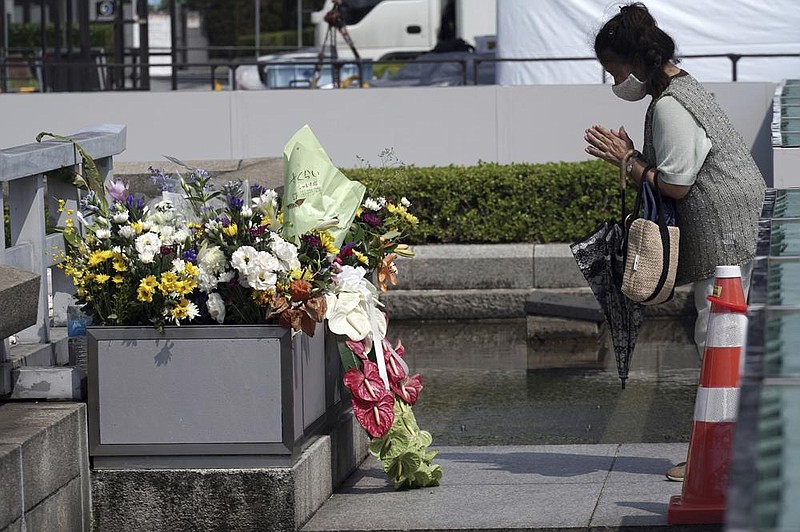HIROSHIMA, Japan -- On the 75th anniversary of the atomic bombing of Hiroshima, the memorial events have been scaled back this year because of the pandemic.
This morning in Hiroshima's Peace Memorial Park -- near the center of the Aug. 6, 1945, blast that destroyed the city -- Mayor Kazumi Matsui is set to renew a "Peace Declaration" on behalf of the city and appeal to Japan's government to ratify a 2017 U.N. treaty proposing the elimination of nuclear weapons, he told a news conference last week.
Crowds usually reaching in the tens of thousands will be kept away. Just 880 seats, spaced six feet apart, will be placed on the lawn of the park, reserved for dignitaries, civil society representatives, survivors of the bomb attack and families of those killed.
The traditional release of hundreds of doves to symbolize peace was canceled after the pandemic prevented the birds' being trained to return home. A few dozen lanterns containing messages of peace will be floated to mourn those who lost their lives.
Japanese Prime Minister Shinzo Abe is due to speak this morning.
Last year, Matsui issued an impassioned warning against rising nationalism and heightened global tensions, with nuclear disarmament efforts at a standstill.
But his appeal this year will take on an added significance -- the New START, or Strategic Arms Reduction Treaty between the United States and Russia, is due to expire in February, and there is speculation it may not be renewed, unwinding decades of efforts to limit nuclear arsenals.
Matsui will draw parallels to the 1918 flu pandemic of 1918-20, which killed tens of millions of people and was exacerbated by nationalism and international tensions that ultimately led to World War II.
Survivors of the Hiroshima blast also found common links between the threat of nuclear weapons radiation and global fears of covid-19.
"People around the world must work together, must fight this disease, must learn together," said Keiko Ogura, who was 8 when the atomic bomb struck Hiroshima 1.5 miles from her home in the north of the city. "That's the kind of sentiment that we had when we were calling for elimination of nuclear weapons."
Ogura was knocked unconscious by the blast in 1945 and awoke to find houses gutted or engulfed in fire, and a line of burned and injured people gradually emerging from the city center.
She has spent her life recounting her experiences and calling for the elimination of nuclear weapons, and says she sees encouraging signs that young people are taking up the campaign. But she warned that complacency could easily see the world sliding rapidly downhill toward nuclear war.
Ogura, 83, is one of a dwindling band of survivors, marking a new challenge in preserving memories of the bombings of Hiroshima and Nagasaki, which took place three days later on Aug. 9, 1945, and led to Japan's surrender in World War II.
"The era with people who have memories is coming to an end, and that means the start of the era without survivors is beginning," said Nagasaki's mayor, Tomihisa Taue, stressing the need to encourage schoolchildren to learn "how to live with people from different cultures" and "to think for themselves."
In Japan, the memory of Hiroshima has fueled a national sense of the country as victim rather than perpetrator of the war, diminishing the memory of the intense militaristic nationalism that led it down such a destructive path.
Indeed, the reluctance of many Japanese people to fully confront its militaristic past in Asia continues to sour relations with its neighbors. In Japan, Abe's government has been criticized for helping obscure the memory of Japan's wartime acts, including removing some references from school textbooks.
"The anniversary of the bomb being dropped has a very significant meaning for Japanese people to develop self-awareness as victims of the war," said Hiroshi Tanaka, professor emeritus at Hitotsubashi University in Tokyo. "That makes it very difficult on such a day to become aware of the other side, as a perpetrator."
